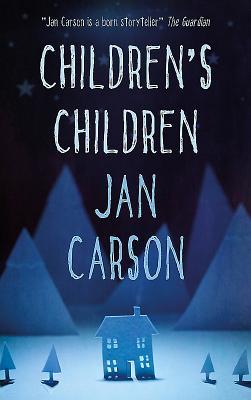Children's Children is a collection of fifteen short stories which cast a darkly humorous and oftentimes acidic eye, over life in post-conflict Northern Ireland. The stories contained in the collection are an eclectic selection of pieces which vary from traditional literary fiction to magic realism and subtle experiments with the short story form. They deal with the theme of legacy; the achievements, issues and problems this generation has inherited from the previous. Disillusioned street preachers, adulterous grocery shoppers, robotic brothers and child burglars are all given voice to express their experiences of life in contemporary Northern Ireland as Carson blurs the line between social commentary and modern parable.
Goodreads description
As the Goodreads description above makes clear not all the short stories in this collection are magic realism, nevertheless a lover of magic realism will find much to enjoy here. There is often a blurring of the edges in these stories, an unusual eye and voice.
The characters in the stories are mostly ordinary folk, but they have something that sets them apart and makes them struggle. This is reflected in Carson's remarkable ability to write passages that combine the mundane with original and telling observation:
Dr Turner had laughed then, exposing the whiteness of his teeth. They were like tiny fingernails lined along his gums. The taste of coffee came off him every time he opened his mouth, for he was the type of man who leaned too close to women when he spoke.
These passages can be both humorous and dark at the same time.
The most obviously magic-realist story is the one about a mother of a floating six-year old who has to be tethered to the backyard fence to prevent her floating off. Then there is the story of the human statue who is losing the ability to move and impact of his immobility on his marriage. Other stories border on magic realism with an off-beat way of presenting the world, not magic realism but not conventional realism either. For example in one story a man creates an allotment in his box room and in another story a couple's elicit love affair consists entirely of shopping together.
The stories are sometimes allegorical and even political. The most obvious of these is the story Children's Children, in which the last two young people on an island meet the day before they must marry for the good of the island . He is from the northern part and she from the south. But where should they live: If we both move north, we'll upset the balance and tip the island into the sea.
In addition to these magic realist, allegorical and off-beat pieces, there are some stories which are heartbreakingly realistic. These include stories about a woman's loss of a spouse, a child's view of fighting parents, and a daughter dealing with her mother's dementia.
In contrast to most short story collections, which usually have a few less strong stories among the good, I found all the stories in the collection strong and moving. As a consequence I will look out for a copy of Jan Carson's first novel Malcolm Orange Disappears.
I received this book free from the publisher in return for a fair review.
The characters in the stories are mostly ordinary folk, but they have something that sets them apart and makes them struggle. This is reflected in Carson's remarkable ability to write passages that combine the mundane with original and telling observation:
Dr Turner had laughed then, exposing the whiteness of his teeth. They were like tiny fingernails lined along his gums. The taste of coffee came off him every time he opened his mouth, for he was the type of man who leaned too close to women when he spoke.
These passages can be both humorous and dark at the same time.
The most obviously magic-realist story is the one about a mother of a floating six-year old who has to be tethered to the backyard fence to prevent her floating off. Then there is the story of the human statue who is losing the ability to move and impact of his immobility on his marriage. Other stories border on magic realism with an off-beat way of presenting the world, not magic realism but not conventional realism either. For example in one story a man creates an allotment in his box room and in another story a couple's elicit love affair consists entirely of shopping together.
The stories are sometimes allegorical and even political. The most obvious of these is the story Children's Children, in which the last two young people on an island meet the day before they must marry for the good of the island . He is from the northern part and she from the south. But where should they live: If we both move north, we'll upset the balance and tip the island into the sea.
In addition to these magic realist, allegorical and off-beat pieces, there are some stories which are heartbreakingly realistic. These include stories about a woman's loss of a spouse, a child's view of fighting parents, and a daughter dealing with her mother's dementia.
In contrast to most short story collections, which usually have a few less strong stories among the good, I found all the stories in the collection strong and moving. As a consequence I will look out for a copy of Jan Carson's first novel Malcolm Orange Disappears.
I received this book free from the publisher in return for a fair review.

No comments:
Post a Comment